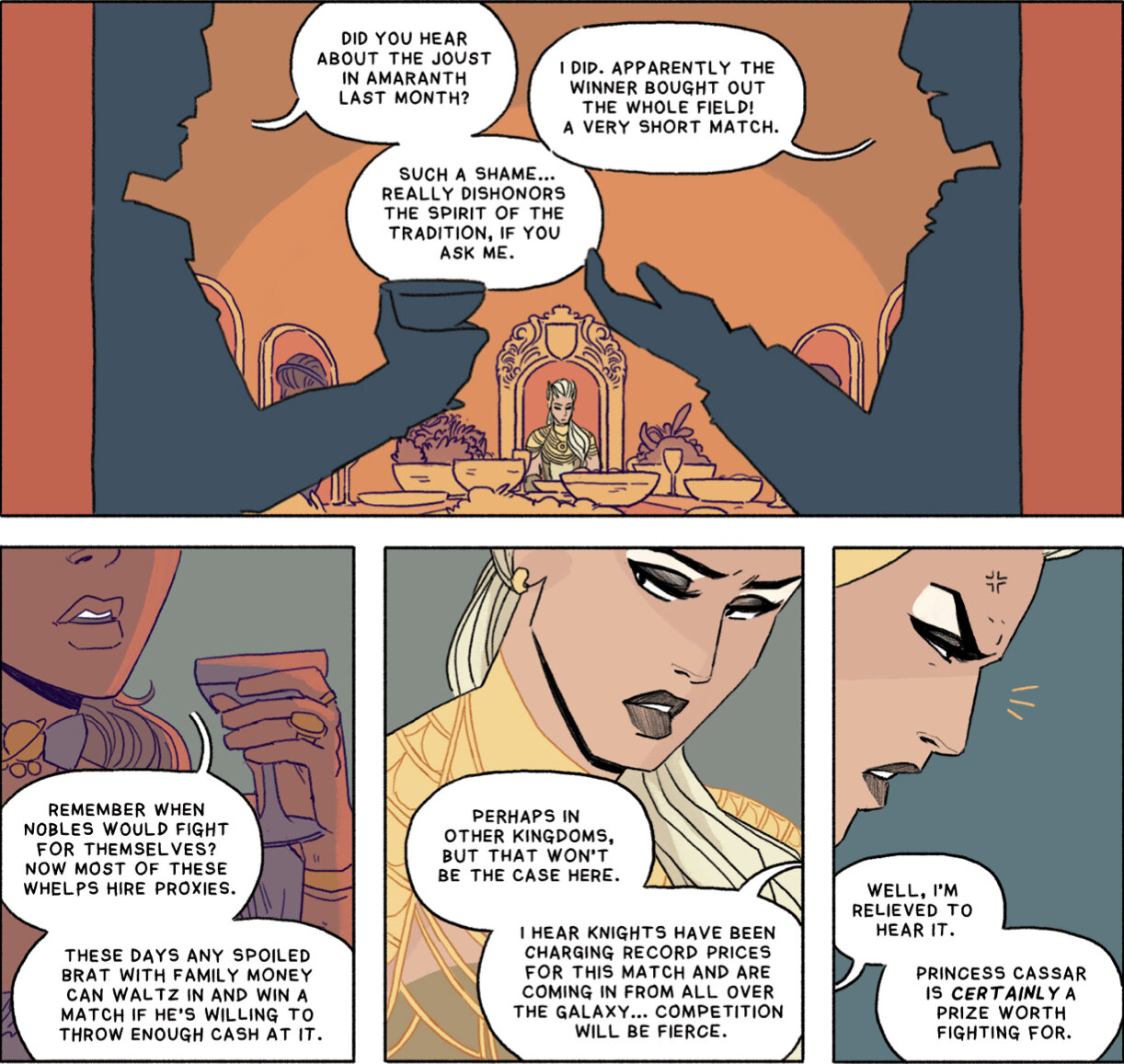Cosmoknights by Hannah Templer is the story of run-away mechanic Pan and her journey to find her friend Tara, the missing princess of their homeworld, who Pan helped escape years before. Pan teams up with Cosmoknights Cass and Bee, warriors for hire that compete in battle royals to win a princess’s hand in marriage. Instead of delivering the princess to their client though, Cass and Bee let the princess go to live her own life. Soon after teaming up with Pan, their group gains a fourth member in Kate, who proposes that simply spiriting the princesses away is not enough, and that the entire tradition of jousting must be eradicated for princesses to truly be free.
How are gender expectations proven to be malleable constructs?
For many people, gender is a rigid concept. For them, the gender binary and the ways to express it are intrinsically tied to sex, and these ways have never changed since the dawn of humanity. Of course, this is all based on the idea of gender as a natural concept when, in reality, it has always been a human construct. The irrefutable evidence of it is the simple fact that gender has been expressed in different ways throughout time and across cultures. While some similarities exist, what constitutes masculinity and femininity nowadays is different from what it was 100 years ago. Similarly, the concept of gender not as a binary but rather a spectrum has slowly been gaining acceptance as more people understand that the rigid conceptualization of gender has been one of humanity’s greatest self-imposed restrictions.
Credit: Hannah Templer
A four-panel page.
First panel: Cass is sitting at the head of a lavishly plated dinner table, crestfallen. The forefront is framed by two silhouetted party guests.
Guest 1: Did you hear about the joust in Amaranth last month?
Guest 2: I did. Apparently the winner bought out the whole field! A very short match.
Guest 1: Such a shame... Really dishonors the spirit of the tradition, if you ask me.
Second panel: A close-up of the guest a she raises a goblet.
Guest 2: Remember when nobles would fight for themselves? Now most of these whelps hire proxies. These days any spoiled brat with family money can waltz in and win a match if he’s willing to throw enough cash at it.
Third panel: A close-up of Cass as she notices the conversation taking place.
Guest 1 (off-panel): Perhaps in other kingdoms, but that won’t be the case here. I hear knights have been charging record prices for this match and coming in from all over the galaxy... Competition will be fierce.
Fourth panel: A profiled close-up of Cass incensed by the guests’ comments.
Guest 2 (off-panel): Well, I’m relieved to hear it. Princess Cassar is certainly a prize worth fighting for.
While Cosmoknights focuses on the gender role princesses are expected to adhere to, there is some evidence as to how hegemonic masculinity works. For a nobleman to truly be a part of masculine hegemony, he must marry a princess as this is his only way to achieve royal power. A shift has occurred, however: instead of nobles jousting themselves, it is now common for them to hire Cosmoknights as proxies. At first glance, this may seem shameful and emasculating, but hegemonic masculinity never lets itself lose power. Because of its hegemonic authority, it can shift to accommodate to the changing times, basically changing the rules halfway through the game. As such, the power to hire Cosmoknights becomes a higher valued marker of masculinity than doing one’s own jousting.
Credit: Hannah Templer
A seven-panel page.
First panel: In the foreground, the King looks over his shoulder as the capsuled throne rises on its platform in the background.
Second panel: A far shot of the castle’s exterior. The foreground is made up of the silhouetted cheering crowd while the King address the crowd from a balcony below in the background.
King: Cosmoknights!
Third panel: From a lower level, a profiled close-up of a knight as the King continues his speech from the same balcony, which this time is seen above.
King: Today, you fight in a time-honored tradition.
Fourth panel: Cass is fully armored, her helmet tucked under her arm.
King (off-panel): You know the rules. Last knight standing takes the prize.
Fifth panel: A close-up of Cass’s grieves as she steps up a ledge.
King (off-panel): Keep it clean...
Sixth panel: A profiled shot of Cass putting on her helmet.
King (off-panel): And may the best man win.
Seventh panel: Cass stands radiantly fully armored and armed, standing on a window ledge.
Even though jousting is considered a time-honored tradition, the nobility has actually been complicit in its shifting rules. As the ruling class, they have the power to reconfigure the practice as they please to best legitimize their power. If combat is no longer valued among the nobles, then that value can be shifted to wealth and the means to hire others to do one’s work. Thus, hegemonic masculinity preserves its status. For the princesses, femininity is a lot more rigid, but Cass was able to find a chink in the armor. She’s of noble birth and trained in combat. What if she won herself in the joust? While the details are unclear, it’s safe to say it worked. Cass proved that the rigid gender roles princesses are raised in can be shattered if they are presented with the opportunity to reclaim their own agency.

